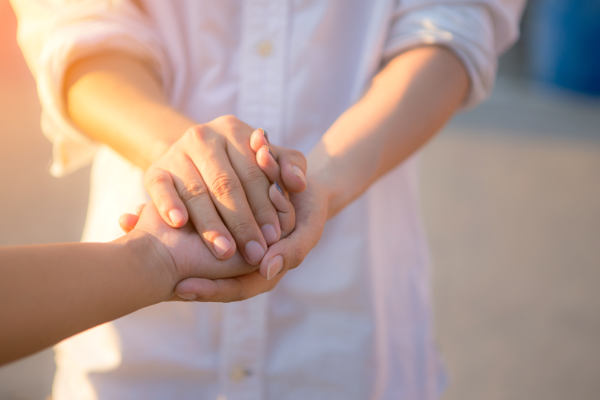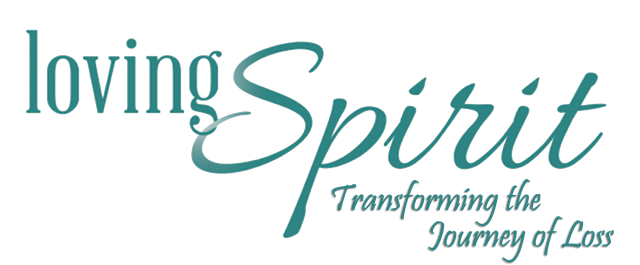Consider the human condition: we are all born, we all die, and sooner or later we all grieve. Our birth experience was completely out of our control. Our death experience may be also, except in limited circumstances where we know is it coming and we can be mindful and planful about it. It is our grief experiences that offer the greatest opportunities for us to have any meaningful impact or control over the human condition.
Loving Spirit is trying to change the way we think about, prepare for, and respond to grief and loss. We do this through teaching skillsets, mindsets and tools that people can use to help transform their journey of loss. The teaching takes place either from the books we have published on the subject, or attendance at free, two-day workshops we offer nationally.
Here is how it works. In a typical workshop audience of 30 participants there will be quite a number who are there because of the death of loved ones, a few will have come because of a divorce, some will be dealing with illness-related issues, others will come because of career, financial, violent events, or empty nest circumstances. They will be male, female, lesbian, gay or transgendered, young and old, multi-racial, and all across the economic spectrum, from the wealthy to the homeless.
Many will describe their particular loss in catastrophic terms. It was a “cataclysmic separation and divorce,” rather than a mere separation and divorce. A teenager who died in a one-car accident was described as “being killed,” along a highway. At the start of their workshop experience participants often feel that their loss is somehow bigger than, more painful, or more impossible to recover from than anyone else’s. While this is completely understandable, because that is how they feel in the moment, going through the two-day experience often gives them new perspective about their situation.
On Day One they learn that grief is a universal experience. It is a healthy, normal response to loss. Humans are not the only species who grieve, elephants, giraffes, dolphins, apes and other species have also been shown to express sadness and loss when a member of their community dies. Grief doesn’t discriminate. It doesn’t care how old you are, how affluent or how poor you are, what your race is, or your religion, or your ancestry. Everyone has a grief story

And on Day One they share the story of their loss with one other participant, a total stranger whom they choose by eye contact only. The sharing of their story is done is a tight time frame where they have a limited amount of time to tell their story followed by a limited amount of time to listen to the other participant’s story. During this story-telling exercise the walls begin to crumble. A participant who thought that hers was the worst loss of all when her husband left her after thirty-six years of marriage, is now hearing a mother tell about the suicide of her teenaged daughter and the guilt she bears over things she did or failed to do.
This story telling is done within the context of a Native American medicine wheel, which is a sacred space designed to have us look at our story from new perspectives. It might mean viewing our life in terms of the passing of seasons, the cardinal directions, or even just sitting and being with our truth while seeking new insights. The combination of being in sacred space, combined with telling and listening to our stories is a powerful tool that allows the participants to feel our universal humanity, our oneness.
And on Day Two they learn that the extreme stress of grief and loss can cause a detrimental impact on our behaviors. This is explained through the lens of looking at our individual personality types and how we all can manifest what is called Shadow Behaviors if we become overly stressed. When they see that being in grief often triggers these types of negative behaviors it allows them to admit mistakes they made or to begin to forgive those who may have wronged them as well.
This realization that they may have said or done something that was hurtful to others or that the hurt they experienced by things said or done by others may have been directly attributable to acting under extreme stress allows them to move toward forgiveness and reconciliation. This shift in awareness is a huge breakthrough and the beginning of a healing process for many participants. And because it happens in a group context, they see and hear that others are having similar breakthroughs, thus strengthening the sense that we are all deeply human and deeply flawed beings.
We hear from participants who tell us about friendships they forged at their workshops that continue well afterwards. And we also hear about relationships that were rebooted after an acknowledgement of errors that were made or wrongs that were done. Following their attendance many offer to volunteer to keep the workshops going, or make donations to pay it forward so others can attend. A kind of community of grievers forms around their shared experience of humanity.
This is not unlike what our nation experienced in the immediate aftermath of 9/11, where people came together across all divides to express our solidarity of spirit and determination to rise above the terrible tragedy. We became more open, warmer and more willing to pitch in and lend a hand, even with total strangers.
Rosemary Sloan, the Chair of our Loving Spirit Board of Directors, has said that Loving Spirit provides a space where magical things happen, where participants get gifts they were not expecting by participating in a workshop. I think what she was talking about were the unexpected connections, new insights and fast friendships that form over the uniting power of grief.
Perhaps you will come see for yourself. Check our website, www.lovingspirit.info/workshops for the schedule of upcoming workshops near you.
